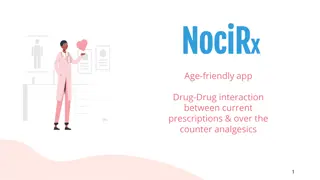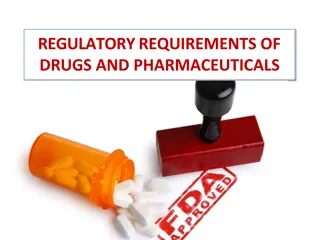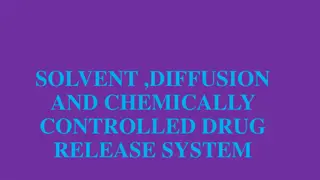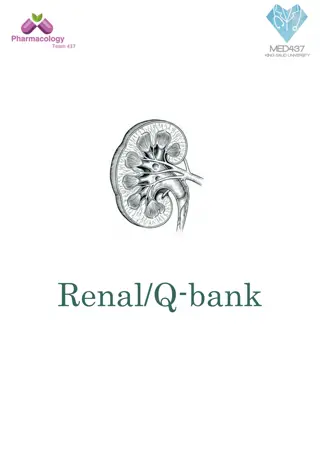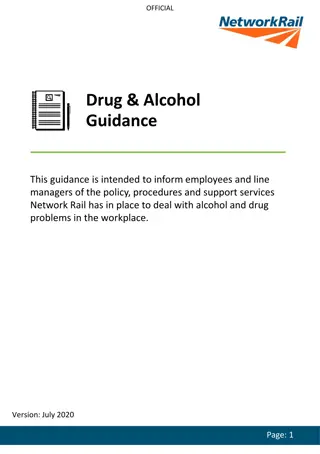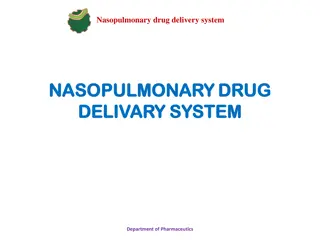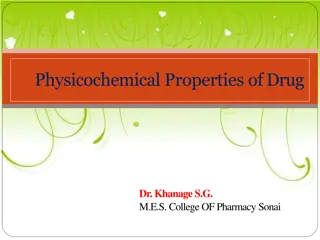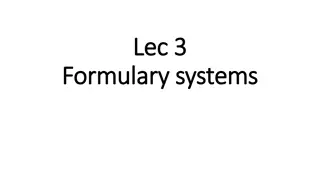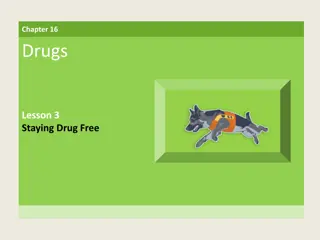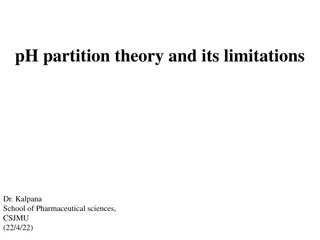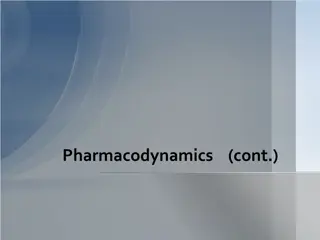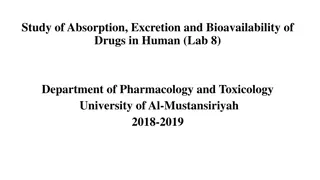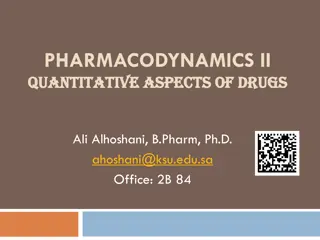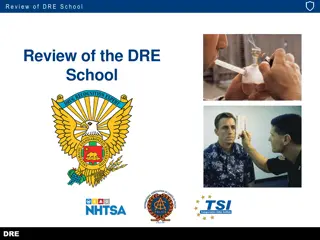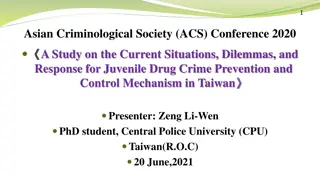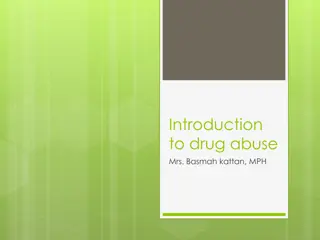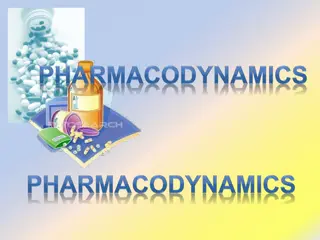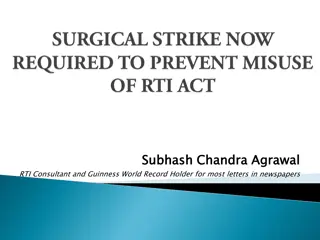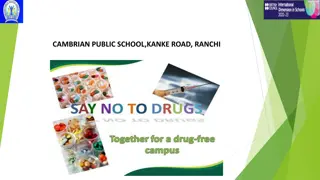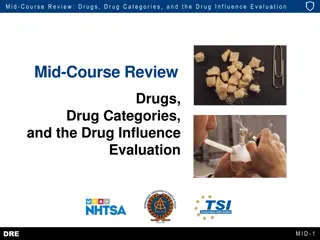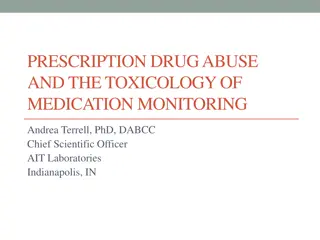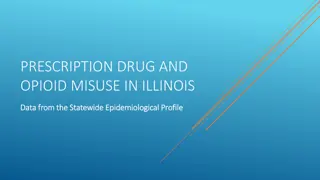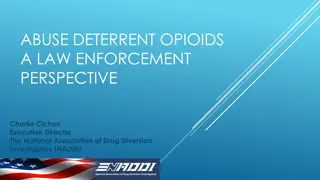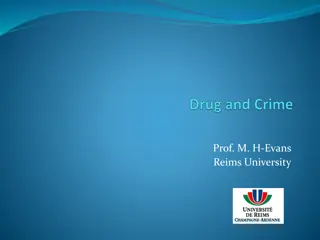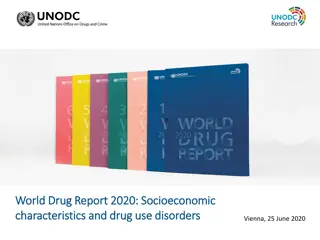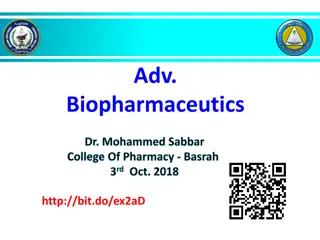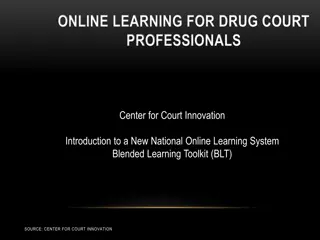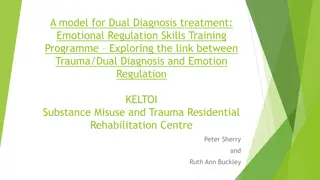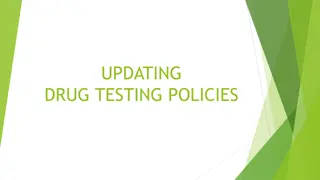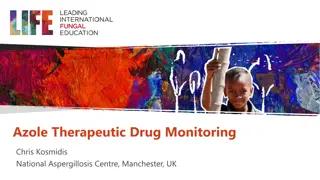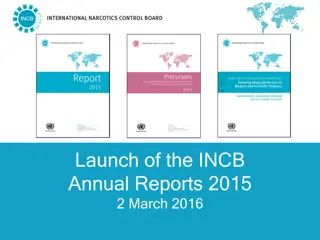Drug-Free Workplace Training Overview
This drug-free workplace training provides essential knowledge for supervisors in identifying and responding to substance misuse among employees. It covers statistics on substance use disorders, the benefits of a drug-free workplace, relevant federal laws, warning signs of substance misuse, and the
2 views • 27 slides
Age-Friendly App: Managing Drug-Drug Interactions Between Prescriptions and OTC Analgesics
The Age-Friendly app addresses the crucial issue of drug-drug interactions between current prescriptions and over-the-counter analgesics in the geriatric population. With a significant percentage of OTC sales attributed to older adults, there is an increased risk of adverse drug events due to polyph
1 views • 25 slides
Understanding Hidden Harm: Impact of Substance Misuse on Young People
The Norfolk Drug and Alcohol partnership aims to address the hidden harm caused by substance misuse, specifically focusing on young people affected by someone else's drug or alcohol problems. The project seeks to bring statistics to life, raise awareness, and encourage support for those experiencing
4 views • 29 slides
Understanding the Significance of Names and Misuse of God's Name
Names carry great importance in shaping our identity, and their intentional misuse can cause harm. The misuse of God's name is a serious matter, with implications for respect and reverence. Understanding the significance of names, especially in the context of God's name, is crucial to avoid any form
29 views • 9 slides
Understanding Regulatory Requirements of Drugs and Pharmaceuticals
Drug regulation involves controlling drug use through international agreement authorities like the FDA, EMA, and PMDA. The FDA plays a crucial role in drug evaluation and research, biologic evaluation, devices, and food safety. There are various types of applications for drug approval, along with a
0 views • 28 slides
Polymeric Controlled Drug Delivery Systems
Polymeric controlled drug delivery systems play a crucial role in regulating drug release through diffusion, solvent penetration, and chemical mechanisms. These systems include diffusion-controlled, solvent-controlled, and chemically-controlled devices, each operating based on specific principles. S
0 views • 33 slides
Renal Pharmacology: Drug Excretion and Renal Clearance Questions
This comprehensive set of questions and answers covers topics related to drug excretion and renal pharmacology. It includes information on glomerular filtration, drug excretion mechanisms, dosage adjustments in renal impairment, factors influencing drug excretion, and the effects of long-term NSAID
0 views • 55 slides
Network Rail Drug and Alcohol Misuse Guidance
The official Drug and Alcohol Guidance by Network Rail outlines the policy, procedures, and support services in place for dealing with alcohol and drug issues in the workplace. It covers the definition of drug and alcohol misuse, signs of misuse, consequences, policy, testing, and employee support.
0 views • 10 slides
Understanding Nasopulmonary Drug Delivery System
Nasopulmonary drug delivery system, utilizing the nasal route for drug administration, offers advantages such as hepatic first-pass metabolism avoidance and rapid drug absorption. This system is beneficial for pharmacologically active compounds with poor stability in gastrointestinal fluids. While i
0 views • 35 slides
Understanding Physicochemical Properties of Drugs
The physicochemical properties of drugs play a crucial role in their pharmacological effects. These properties include physical and chemical characteristics that influence interactions with biomolecules. Solubility, partition coefficient, and dissociation constant are key factors affecting drug beha
1 views • 46 slides
Understanding Formulary Systems in Healthcare
A formulary is a dynamic list of medications curated by healthcare professionals to guide drug selection based on efficacy, safety, cost, and patient acceptability. It plays a vital role in promoting evidence-based and cost-effective drug therapy, improving communication between prescribers and phar
0 views • 17 slides
Ways to Stay Drug Free: Lessons for Teens and Families
Understanding the reasons behind drug usage among teens, this lesson provides valuable resources and strategies to stay drug-free. It emphasizes the importance of making healthy decisions and offers alternatives to drug use. Additionally, it highlights the significance of saying no to drugs, provide
0 views • 17 slides
Understanding the Hatch-Waxman Act: Promoting Affordable Generic Drugs
The Hatch-Waxman Act, also known as The Drug Price Competition and Patent Term Restoration Act, was enacted in 1984 to amend patent laws and the Federal Food, Drug, and Cosmetic Act. It aims to reduce costs associated with generic drug approval, allow early experimental use, compensate branded drug
0 views • 49 slides
Understanding Biopharmaceutics: pH Partition Theory and Drug Absorption
Biopharmaceutics explores how drug properties and administration methods impact drug absorption. Factors affecting oral absorption include membrane physiology and drug partitioning based on pH levels. The pH partition theory, explained by Brodie et al., highlights the role of drug lipid solubility a
0 views • 9 slides
Importance of In-Vitro Dissolution Testing in Drug Assessment
In drug development, in-vitro dissolution testing plays a crucial role in evaluating drug release from tablets when in-vivo bioavailability studies are limited. By ensuring drug release is close to 100% and uniform batch to batch, these tests help assess drug availability and effectiveness. Regulato
11 views • 10 slides
Understanding Pharmacodynamics: Potency and Efficacy
Pharmacodynamics explores how drugs interact with receptors in the body, affecting the magnitude of drug effects based on concentration. Graded dose-response relationships, potency, and efficacy play key roles in determining drug efficiency. Potency reflects the amount of drug needed for a specific
0 views • 21 slides
Understanding Drug Absorption, Excretion, and Bioavailability in Humans
Delve into the complex processes of drug absorption, excretion, and bioavailability in the human body. Learn about the various factors affecting drug absorption from the gastrointestinal tract, including biological, physiochemical, and pharmaceutical factors. Explore the mechanisms of drug transport
0 views • 24 slides
Understanding Quantitative Aspects of Drug Action
Explore the quantitative aspects of drug action, including drug receptor binding, concentration binding curves, dose-response curves, and types of antagonism. Learn to relate drug concentration to receptor binding capacity and response produced. Discover how concentration binding curves and dose-res
0 views • 29 slides
Review of DRE School and Drug Evaluation Techniques
Explore key topics such as the definition of drugs for DRE purposes, basic drug statistics, review of symptomatology, and vital signs assessment in the context of Drug Recognition Expert (DRE) training. Learn about CNS depressants, stimulants, hallucinogens, and analogs, as well as vital signs like
0 views • 29 slides
Study on Juvenile Drug Crime Prevention in Taiwan: Insights from ACS Conference 2020
This presentation at the Asian Criminological Society Conference 2020 delves into the current situation, dilemmas, and responses regarding juvenile drug crime prevention in Taiwan. The presenter, Zeng Li-Wen, a PhD student at Central Police University in Taiwan, provides valuable insights based on t
2 views • 20 slides
Understanding Drug Abuse: Definitions, Effects, and Stages
Drug abuse is a serious issue involving various substances like prescription drugs, alcohol, and illegal drugs. This includes terms and definitions, effects on the body and mind, stages of addiction, and withdrawal symptoms. Factors influencing drug action and reasons for drug use are also explored.
5 views • 45 slides
Understanding Drug Targets and Mechanisms of Action
Explore the intricate world of pharmacokinetics and pharmacodynamics, from drug absorption to their interaction with biological molecules. Learn about different drug targets, such as proteins and ions, and how drugs alter their biochemical and biophysical activities. Dive into molecular mechanisms o
3 views • 17 slides
Challenges and Solutions in Preventing Misuse of the RTI Act in India
Over the years, the RTI Act in India has faced challenges due to misuses by individuals for personal gains. Efforts to prevent such misuse through training, Supreme Court verdicts, and CVC circulars have been observed. The need for regular modifications and refinements to address misuse and maintain
0 views • 11 slides
International Day Against Drug Abuse and Illicit Trafficking 2022 Initiatives and Awareness
The United Nations observes 26th June as the International Day Against Drug Abuse and Illicit Trafficking to combat substance abuse worldwide. Various initiatives like the National Drug Master Plan, Nasha Mukt Bharat Abhiyaan, and the National Action Plan for Drug Demand Reduction aim to raise aware
3 views • 9 slides
Comprehensive Review of Drugs, Categories, and Drug Influence Evaluation
This mid-course review covers key aspects such as defining drugs, naming drug categories and subcategories, identifying drug categories for specific drugs, components of drug influence evaluation, and examinations conducted as part of the evaluation process. The content also includes identifying dru
0 views • 28 slides
Toxicology and Medication Monitoring in Prescription Drug Abuse
Prescription drug abuse is a growing concern, with millions of emergency department visits related to drug misuse or abuse annually. Non-compliance and lack of standardization in testing processes add complexity to monitoring and detecting drug abuse. Pain management panels include various opioids,
0 views • 23 slides
Prescription Drug and Opioid Misuse in Illinois Epidemiological Profile
Explore the Illinois Statewide Epidemiological Profile on Prescription Drug and Opioid Misuse, developed by the Illinois Statewide Epidemiological Outcomes Workgroup and funded by Substance Abuse and Mental Health Services Administration. The profile covers consumption, prevalence, contributing fact
0 views • 28 slides
Opioid Abuse Deterrent Strategies: Law Enforcement Insights
The National Association of Drug Diversion Investigators (NADDI) focuses on combating prescription drug diversion through advocacy, training, and collaboration with law enforcement. They address the misuse of opioids like OxyContin and Oxycodone, showing successes in reducing diversion and deaths in
0 views • 14 slides
The Statistical Association Between Substance Misuse and Criminal Behavior
This brief synthesis discusses the statistical association between substance misuse (specifically drugs and alcohol) and criminal behavior. It draws upon meta-analyses investigating the links between drug use and crime, as well as alcohol consumption and violent behavior. Various theories are explor
0 views • 12 slides
Impact of Socioeconomic Conditions on Drug Use Disorders: Insights from World Drug Report 2020
The World Drug Report 2020 highlights the strong correlation between socioeconomic factors and drug use disorders. Studies reveal that communities facing poverty, violence, and social inequality are at a higher risk of drug overdoses and addiction. Factors like income inequality, lack of social capi
1 views • 17 slides
Understanding Targeted Clinical Investigation in Pharmacovigilance
Targeted clinical investigation plays a crucial role in pharmacovigilance by further evaluating significant risks identified in pre-approval clinical trials. This involves conducting pharmacokinetic and pharmacodynamic studies, genetic testing, interaction studies, and large simplified trials to ass
0 views • 12 slides
Steps to Cope: Supporting Youth Affected by Parental Alcohol Misuse
Steps to Cope is a structured intervention program aimed at helping young people aged 11-18 who are impacted by parental alcohol misuse. Through a five-step approach, the program focuses on building resilience, coping strategies, and social support. Training is provided to practitioners and trainers
0 views • 24 slides
Advances in Ophthalmic Drug Delivery Systems
This content explores various advanced ophthalmic drug delivery systems including erodible ophthalmic inserts, soluble ocular drug inserts, new ophthalmic drug delivery systems, and bioadhesive ophthalmic drug inserts. These innovative systems aim to provide accurate dosing, prolonged drug release,
0 views • 8 slides
State Responsible Inmates with Marijuana Convictions Research Report
Research conducted by VADOC indicates a total of 570 state responsible inmates incarcerated for marijuana-related offenses as of August 31, 2021. Among them, 229 inmates had non-drug-related Most Serious Offenses, 331 were convicted for Drug Sales MSO, and 10 were convicted for Drug Possession MSO.
0 views • 7 slides
Innovative Online Learning for Drug Court Professionals
Center for Court Innovation has introduced a new National Drug Court Online Learning System aimed at assisting drug court professionals. This system offers free access to web-based training, expert video lessons, virtual site visits to drug treatment courts, practitioner interviews, and a resource l
0 views • 8 slides
Exploring the Link Between Trauma, Dual Diagnosis, and Emotional Regulation in Substance Misuse Treatment
The Emotional Regulation Skills Training Programme at Keltoi Treatment Model focuses on addressing the complex relationship between trauma, mental illness, and substance misuse. Challenges in treating trauma and substance misuse are highlighted, emphasizing the importance of addressing both issues f
1 views • 16 slides
Understanding Drug Testing Policies in the Workplace
The Drug-Free Workplace Act of 1988 mandates federal grant recipients to implement zero-tolerance drug policies to maintain a drug-free environment. Employers must establish clear policies, conduct awareness programs, offer counseling and rehabilitation services, and impose penalties for violations.
0 views • 19 slides
Understanding Azole Therapeutic Drug Monitoring for Antifungal Therapy
Azole therapeutic drug monitoring (TDM) is crucial for managing antifungal therapy due to factors like drug interactions, compliance issues, disease severity, and pharmacokinetic variability. This monitoring helps ensure optimal drug levels are maintained for effective treatment. Different TDM metho
0 views • 18 slides
Overview of International Drug Control Efforts and Challenges in 2015-2016
The content highlights significant events related to international drug control efforts, emphasizing the launch of the INCB Annual Reports, the UNGASS session at the United Nations, and the focus on health, welfare, and challenges in combating drug abuse. It discusses issues such as new psychoactive
0 views • 13 slides
Analgesic Study with Three Treatments Crossed with Gender
This study explores the effects of analgesic treatments crossed with gender on pain levels. The data analysis includes factors such as gender and drug type, and the statistical model examines pain index as a linear function of factor levels. The ANOVA results indicate significant effects of gender,
0 views • 17 slides

